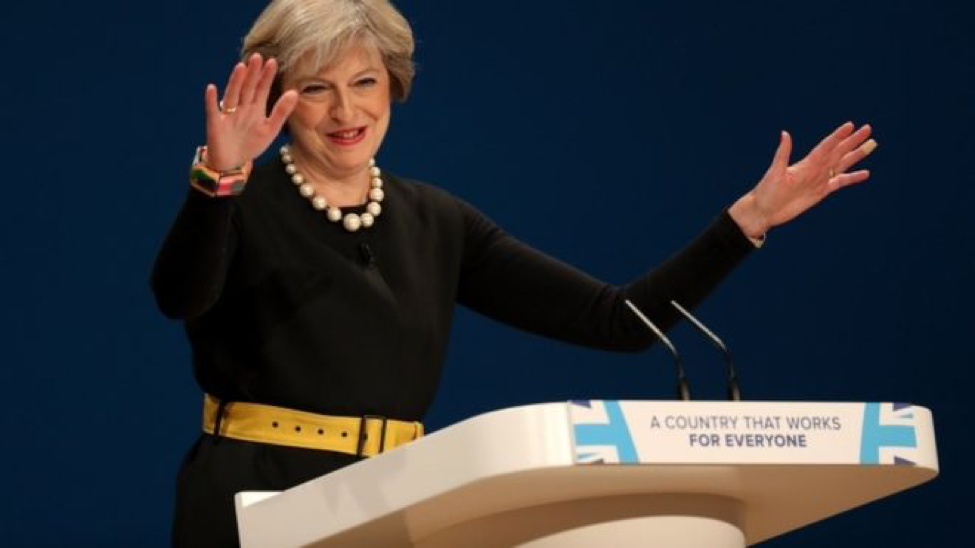By Gabrielle Lohner
Last month, British Prime Minister Theresa May delivered a firm laying out Britain’s plan to the widely-speculated Brexit. She explained her twelve-point plan to exit the European Union while also creating a stronger, “truly global Britain.” The speech was consistent with the idea of a “hard” Brexit, emphasizing the differences between the European Union (EU) and the United Kingdom (U.K.) which she claims led to the public support of leaving the EU. Prime Minister May’s speech laid out a nice image of an international, post-Brexit Britain, which is disconnected with the reality that will soon face the United Kingdom.
The Brexit will completely remake the British economy. May is well aware of this fact, but her comments on how to move forward with the country’s economic future are contradictory and confusing. The most impactful forthcoming change will be the loss of free trade to the rest of the EU members. The European Union provides its members access to the Single Bloc, or the unified economic market across Europe which removes internal borders and regulatory hindrances to trade. The EU believes that within its member countries, there should be free movement of goods, services, capital, and people. The movement of people is what motivated many to vote to leave the EU, as an anti-immigrant sentiment, not unlike the one in the United States, continued to grow. The British electorate – or rather, 52 percent of it – chose to increase their isolationism by restricting who can enter their country. Recreating the benefits awarded to an economy through the Single Bloc will be tough, especially since Prime Minister May is hoping to create customs unions for certain sectors, such as automobiles.
Despite the zeitgeist of the voters, May alluded to Britain’s increasing international presence multiple times during her speech. She used the term “global Britain” ten times, and sees her country as one that is “the best friend and neighbor to our European partners, but a country that reaches beyond the borders of Europe too.” The idea that a country that has decided to leave one of the most powerful international organizations is expecting to increase its global economic share is surprising, if not ludicrous. In 2016, 44 percent of British exports went to other EU member countries. Without membership of the Single Bloc, British goods are open to taxes, quotas, and increased regulations from fellow European countries.
Not only will exporting goods likely become more expensive, corporations are also rethinking their British occupation. Many global companies have chosen Britain to house their European headquarters due to the language, culture, and accessibility to the rest of the EU. When this accessibility diminishes or completely disappears, the advantages to being headquartered in Britain do as well. London is known for its financial industry, and banks within the country are well aware of the impact the “leave” vote will have on their operations. Citigroup is looking at other European countries such as Italy, France, Ireland and Spain; the head of Citi’s European Operations that their issue stems with the loss of “passporting rights,” which currently allow people within the Bloc to move freely between countries. Other banks such as JP Morgan, HSBC, and Goldman Sachs are planning to reduce staff in London or relocate to more favorable European cities.
The British policy makers are well aware of how this movement will hurt their economy and are attempting to counter the probable impact. May’s proposal to keep Britain as a core member of European trade is based on the hope of negotiating a free trade agreement with the EU, calling for the “freest possible” trade of goods and services. This sounds similar to the current EU regulations, but one thing is missing – the people. The EU will likely set up a deal with Britain, due to its established industry and presence within Europe; but, as John McTernan notes, “the UK is in a weak negotiating position.” Weakening this position even further was the resignation of Sir Ivan Rodgers, the United Kingdom’s permanent representative to the EU, in early January. Sir Ivan openly shared his discontent with the British handling of Brexit in an to his staff, in which he writes, “the structure of the U.K.’s negotiating team and the allocating of roles and responsibilities to support that team, needs rapid resolution.”
Prime Minister May is aware of the negotiating position Britain is in, and in an attempt to gain the upper hand has threatened to make the U.K. a tax haven by lowering regulations and taxes. Doing so would undermine the well-established industries and companies that have come out of Britain, and could end up hurting the locals. Tax havens are exploited by international investors for financial services which often ends up creating social inequality, as shown by counties like Panama, Antigua and Barbuda, and even Luxembourg. The U.K. relates more closely to the latter not only in location but also in its established business presence. Many think of Luxembourg as the most successful example of a tax haven, but on closer examination the country seems less prosperous. The workforce is comprised of 60 percent foreigners who come to Luxembourg and utilize the country’s services and benefits. The Atlantic reported that there is a clear division of “expat-versus-local,” as inequality continues to grow. It is likely that these comments by Mrs. May were just talk, and that Britain will avoid becoming one of these tax havens; but, if they do, it will have big implications on the business atmosphere and the locals, as shown in countries worldwide.
It is possible that May believes the future of Britain is one that flourishes in global trade and increases its international presence. But, during her speech, she seemed out of touch with the electorate when stating that “[Britain] will always want immigration…and we will always welcome individual migrants as friends.” Many have suggested and wondered whether racism or xenophobia influenced the vote to leave, and it is hard to completely refute that idea. The possibility that some British voters were unaware how this would affect their country other than controlling the number of people coming into the country is scary, but conceivable. The day after the Brexit, Google analytics showed that the amount of people in Britain searching the question “what happens if we leave the EU” had more than tripled.
No one should be rooting against Britain. They are an important trading partner and ally to the United States, and it is essential for the global economy that they continue to prosper and grow. The British people have made their choice, and now it is crucial that political leaders step up and take logical, conceivable actions to help their country move onwards and upwards.


